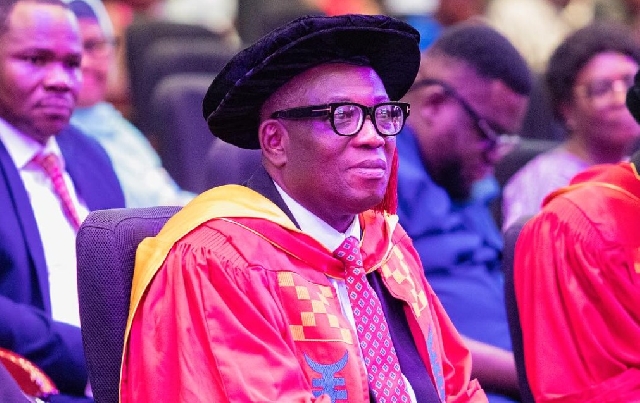Prof Albert Puni calls for merit-based appointments for SOEs to drive sustainable national development
 Prof Albert Puni
Prof Albert Puni
Prof Albert Puni, a governance and leadership scholar at the University of Professional Studies, Accra (UPSA), has called for a comprehensive reform of the selection and appointment process for board members and chief executive officers (CEOs) of State-Owned Enterprises (SOEs) in Ghana.
He said a transparent, merit-based, and sustainable approach is essential to reversing the chronic underperformance that has plagued the sector for decades.
Delivering his inaugural lecture at UPSA on the topic “State-Owned Enterprise Governance: Towards a Sustainable Board Appointment and Nomination Process for Sustainable National Development,” Prof Puni underscored the link between poor governance and the persistent financial losses recorded by Ghanaian SOEs.
“The persistent loss-making and governance failures observed in Ghanaian State-Owned Enterprises can be directly traced to a flawed genesis of the process of selecting and appointing Board members and Chief Executive Officers,” he stated.
Prof Puni explained that most Ghanaian SOEs have been operating at a loss since the 1960s, with several either privatised or closed down following recommendations from the World Bank.
The trend, he noted, continues to this day, citing a collective net deficit of GHS 2.4 billion recorded by SOEs in 2024.
He attributed this situation to political interference in appointments, lack of independent oversight, and weak accountability mechanisms.
“Successive governments have not applied independent, technocratic, and merit-based processes for the selection and appointment of Boards and CEOs. The result has been weak leadership, poor decision-making, and limited sustainability in operations,” he lamented.
The professor drew on several corporate governance theories, including Agency Theory, Stewardship Theory, Resource Dependency Theory, and Stakeholder Theory, to emphasise the importance of ethical, competent, and independent leadership in public enterprises.
According to him, these theories collectively point to the need for transparent and merit-driven appointment systems that balance the interests of all stakeholders while ensuring accountability and performance.
Prof Puni also analysed the constitutional and legal frameworks governing appointments in SOEs, particularly the Presidential (Transition) Act, 2012 (Act 845) and the Supreme Court’s ruling in Theophilus Donkor versus The Attorney General, which clarified the tenure and removal of SOE boards and CEOs.
Despite this clarity, he noted, successive governments have continued to dismiss both boards and CEOs following political transitions, contrary to the spirit of the law.
“Even after the Supreme Court’s ruling, new Presidents continue to terminate appointments of boards and CEOs, sometimes without due process.
CEOs are often appointed before boards are constituted, undermining accountability and governance integrity,” he observed.
Prof Puni commended the establishment of the State Interests and Governance Authority (SIGA) under Act 990 of 2019, which was designed to streamline the appointment and oversight of SOEs.
However, he expressed concern that SIGA’s potential has been undermined by persistent political influence.
To address these governance gaps, Prof. Puni proposed a new framework for appointing SOE leaders, the 3C Model, which emphasises Competence, Commitment and Character.
“Due to rising corruption concerns in our public institutions, character must be elevated as a key criterion in leadership appointments even above party loyalty,” he emphasised.
Profr John Kwaku Mensah Mawutor, on his part, praised Prof Puni for his scholarly depth and practical insights into governance challenges.
“He has broken down the theories that underpin corporate governance and proposed pragmatic reforms that are timely and relevant.
The problems in our SOEs are largely man-made, especially in how boards and CEOs are appointed. His recommendations provide a clear roadmap for change,” Prof Mawutor stated.
He expressed hope that the lecture’s findings would inform national policy and urged stakeholders, including SIGA and Parliament, to consider Prof. Puni’s recommendations seriously.
Source: Classfmonline.com/Cecil Mensah
Trending News

Foreign Affairs Minister briefs newly appointed Deputy Heads of Mission
10:56
Moses Baiden honoured at MOBEX Africa Innovation Awards 2025
09:19
MOFFA begins enforcement drive to regularise unlicensed mortuaries
10:58
NSA: Justice Ministry uncovers total loss of ¢2.2b
16:32
President Mahama pledges completion of Western Regional Hospital within 18 months
15:48
NDC supporters lock office of Dormaa West District Assembly Coordinator over appointment dispute
15:59
NDC urges disgruntled NPP members to join United Party
13:07
Gov't launches free tertiary education policy for Persons with Disabilities
10:41
GIPC management meets Volta and Oti MPs ahead of regional investment roadshow
09:05
Galamsey: Cadman Atta-Mills raises red flags over shadow bans on X
12:43



